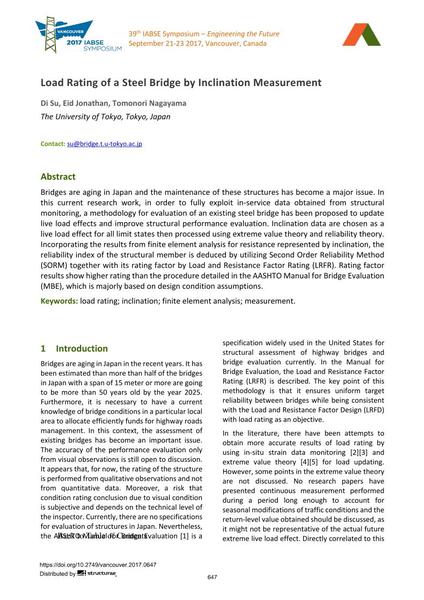Load Rating of a Steel Bridge by Inclination Measurement

|
|
|||||||||||
Bibliografische Angaben
| Autor(en): |
Di Su
(The University of Tokyo, Tokyo, Japan)
Jonathan Eid (The University of Tokyo, Tokyo, Japan) Tomonori Nagayama (The University of Tokyo, Tokyo, Japan) |
||||
|---|---|---|---|---|---|
| Medium: | Tagungsbeitrag | ||||
| Sprache(n): | Englisch | ||||
| Tagung: | IABSE Symposium: Engineering the Future, Vancouver, Canada, 21-23 September 2017 | ||||
| Veröffentlicht in: | IABSE Symposium Vancouver 2017 | ||||
|
|||||
| Seite(n): | 647-654 | ||||
| Anzahl der Seiten (im PDF): | 8 | ||||
| Jahr: | 2017 | ||||
| DOI: | 10.2749/vancouver.2017.0647 | ||||
| Abstrakt: |
Bridges are aging in Japan and the maintenance of these structures has become a major issue. In this current research work, in order to fully exploit in-service data obtained from structural monitoring, a methodology for evaluation of an existing steel bridge has been proposed to update live load effects and improve structural performance evaluation. Inclination data are chosen as a live load effect for all limit states then processed using extreme value theory and reliability theory. Incorporating the results from finite element analysis for resistance represented by inclination, the reliability index of the structural member is deduced by utilizing Second Order Reliability Method (SORM) together with its rating factor by Load and Resistance Factor Rating (LRFR). Rating factor results show higher rating than the procedure detailed in the AASHTO Manual for Bridge Evaluation (MBE), which is majorly based on design condition assumptions. |
||||
| Stichwörter: |
Finite-Elemente-Analyse Messungen
|
||||
